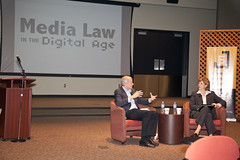
Lucy Dalglish, Executive Director of the Reporters Committee for Freedom of the Press, interviewed David McCraw, Vice President and Assistant General Counsel, The New York Times Company, during the morning plenary session, "The Aftermath of WikiLeaks: The tensions between State Security and Freedom of Information." Photo courtesy of John Ramspott (jramspott) on Flickr.
On Saturday, October 22, I attended the 2011 Media Law in the Digital Age conference, co-sponsored by Kennesaw State University’s Center for Sustainable Journalism and Harvard Law School’s Berkman Center for Internet & Society. After the morning’s plenary session, I attended a panel on “Online Community Building and Managing: What are the Legal and Editorial Concerns You Need to Know?” David Ardia (Assistant Professor, UNC School of Law), Johnita Due (Senior Counsel for Corporate Services, Turner Broadcasting), Lesli Gaither (Dow Lohnes, PLLC), Amanda Martin (General Counsel for North Carolina Press Assn., and Partner at Stevens Martin Vaughn & Tadych, PLLC), and Vera Haller (CUNY) did a great job of managing a lively conversation about the pleasures, perils, and pitfalls associated with building online communities around user-generated content. After lunch, I attended the panel “Social Media and Its Legal Implications: Where Your Personal Life Meets Journalism.” In that session, Josh Azriel (Associate Professor of Communication, Kennesaw State University), Amy Kristin Sanders (Assistant Professor of Mass Communications and Law, University of Minnesota), Justin Brown (Assistant Professor of Telecommunications, University of South Florida), and Josh Levs (Journalist, CNN), offered an engaging discussion of how traditional and citizen journalists are and should be using social media to report on current events.
Over and over again, in response to participants’ questions about privacy and copyright, the panelists in both sessions emphasized the importance of a website’s terms of use in establishing the relationship between site owners and users, and in determining their respective rights and responsibilities. Among other things, the terms of use establish the owner’s right to take down, republish, and modify user-generated content. They also clarify the contributing users’ rights to control their content and personal information, and their potential liability for libelous or infringing content. In the second session, in addition to discussing legal issues, the panel also addressed the ethical considerations that should also shape journalists’ decisions about what and what not to publish.
As I listened to the ongoing exchange between panelists and conference participants, one thing became clear. If professional journalists find the legal and ethical waters of online journalism tricky to navigate, then how can citizen journalists, who may lack formal training in dealing with such issues and certainly don’t have access to in-house counsel when they arise, be expected to deal with them? Because deal with these issues they must. If I understand the general consensus expressed by the legal experts who spoke, US law makes few distinctions between citizen and professional journalists. Except for narrow exceptions created by a variety of state laws that create a reporter/source privilege for professional journalists, they generally have the same legal rights and the same legal obligations. Similarly, a citizen journalist may not understand that, while it may not necessarily be a crime, most professional journalists regard releasing the names of unindicted suspects or victims of sexual assault as ethical violations. Nevertheless, citizen journalists are capable of inflicting, through their unknowing ethical lapses, the sort of individual harm such ethical codes are intended to mitigate.
Two merged initiatives might help citizen journalists become better informed about their legal and ethical rights and responsibilities. First, we could develop model or uniform terms of use that owners of sites dedicated to building and maintaining citizen journalist communities could use. Drawing from the work done by open source developers and Creative Commons, one could create a menu of usable, plain language, terms of use agreements that offered a range of protection and covered the relevant issues. Rather than copying and pasting terms of use from CNN’s iReport or Facebook, site owners could choose agreements that both they and their users could more easily understand. Further, again drawing on the Creative Commons model, the uniform agreements might be the subject of an educational campaign to develop public awareness of their use and purpose. Second, we could develop legal and ethical education programs for citizen journalists, the completion of which would recognized by a badge or credential (call it whatever you like). Verified attendance at a conference like the #MLDA11 might be one component of such an educational program, for example. Acquisition and presentation of the earned credential might then be integrated as one of the terms of use in one or more of the model agreements.
So what do you think? I’m approaching this as a teacher of writing and communication and a critical legal studies scholar, not as a journalist or media lawyer. So I’m very interested in hearing if anyone is already working on something like this. I’d love to know what is out there. I’m also very interested in hearing potential problems with or concerns about the idea.
